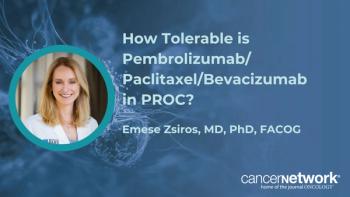
Weekly Dose-Dense Chemo Not Recommended in First-Line Epithelial Ovarian Cancer Treatment
A study showed that first-line treatment for epithelial ovarian cancer using weekly dose-dense chemotherapy did not improve progression-free survival, compared with 3-weekly chemotherapy, in European women.
Weekly dose-dense paclitaxel as a frontline treatment for patients with epithelial ovarian cancer was not found to significantly improve progression-free survival (PFS) compared to the standard 3-weekly chemotherapy, according to results from the ICON8 study published in The Lancet.1
“The results of the ICON8 trial show that it is feasible to deliver weekly dose-dense paclitaxel in combination with either 3-weekly or weekly carboplatin in the first-line treatment of high-risk ovarian cancer,” Andrew Clamp, PhD, of The Christie NHS Foundation Trust, and colleagues wrote. “However, neither of these regimens is associated with an improvement in survival outcomes compared with standard 3-weekly carboplatin–paclitaxel treatment in the predominantly European population treated on this trial.”
The phase III ICON8 trial randomly assigned predominantly European women with newly diagnosed International Federation of Gynecology and Obstetrics stage IC–IV epithelial ovarian cancer to 3 groups.
1,566 women from June 2011 to November 2014 were recruited for treatment as a part of the ICON8 study. In this 3 arm trial, patients in group 1 received carboplatin AUC5 or AUC6 and 175 mg/m2paclitaxel once every 3 weeks; patients in group 2 received carboplatin as in group 1 and dose-fractionated 80 mg/m2paclitaxel weekly; and patients in group 3 received carboplatin AUC2 and 80 mg/m2paclitaxel weekly.
Primary endpoints for the study were PFS and overall survival (OS). Both groups 2 and 3 were individually compared with group 1 (control group) to determine primary endpoint results. Secondary endpoints included safety, quality of life, and health economics.
The median PFS was 17.7 months for the control group (group 1), 20.8 months in group 2, and 21.0 months in group 3.
After a 9-month cross-analysis of the results, the study determined there was no significant difference between the groups with regards to quality of life. As for toxic effects, both group 2 and group 3 treatments were associated with increased instances of grade 3 or higher toxic effects, but these effects were deemed “uncomplicated.”
“Although most patients were able to complete 6 chemotherapy cycles, both weekly treatments were associated with more treatment modifications and a higher incidence of grade 3 or higher toxic effects,” stated in a press issued by the European Society for Medical Oncology (ESMO). “Although grade 3 or 4 toxic effects increased with weekly treatment, these effects were predominantly uncomplicated.”2
The population included both patients who underwent primary cytoreductive surgery (IPS) and those who chose delayed primary cytoreductive surgery (DPS) options. The results from each of these populations also stood as a secondary point of intrigue for the researchers. No significant relationship between surgical decision and treatment schedule was detected.
The ICON8 study was a large, international process including a variety of different patient variables, including demographic, surgery selection and treatment schedule. The study also yielded an 85% chemotherapy completion rate, allowing for valuable results to be drawn from the process. Even more, although the results did not yield a positive development for European women, the weekly-dose treatment can still be an option for Japanese women with epithelial ovarian cancer, who previously demonstrated a superior benefit to the regimen.2
“Weekly dose-dense paclitaxel treatment could still be considered as a first-line treatment option for Japanese women with epithelial ovarian cancer,” said in an ESMO press release. “But the weekly dose-dense paclitaxel should not be recommended as a component of first-line epithelial ovarian cancer treatment for women of non-Japanese ethnic origin.”
Two further studies have been done analyzing weekly dose-dense chemotherapy treatment within the lifetime of the ICON8 study, but the researchers recommend even more investigation into this treatment among different ethnic groups.
References:
1. Clamp AR, James EC, McNeish IA, et al. Weekly dose-dense chemotherapy in first-line epithelial ovarian, fallopian tube, or primary peritoneal carcinoma treatment (ICON8): primary progression free survival analysis results from a GCIG phase 3 randomised controlled trial. Lancet. https://doi.org/10.1016/S0140-6736(19)32259-7.
2. Weekly Dose-Dense Chemotherapy Does Not Improve PFS in First-Line Treatment for Epithelial Ovarian Cancer [press release]. Lugano, Switzerland. Published December 4, 2019. https://www.esmo.org/Oncology-News/Weekly-Dose-Dense-Chemotherapy-Does-Not-Improve-PFS-in-First-Line-Treatment-for-Epithelial-Ovarian-Cancer. Accessed December 11, 2019.
Newsletter
Stay up to date on recent advances in the multidisciplinary approach to cancer.














































